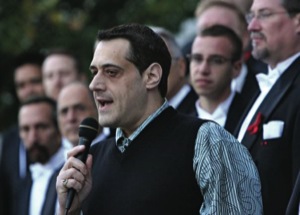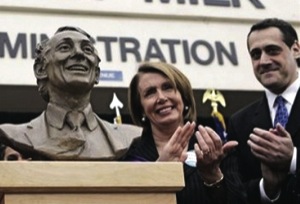feature
Stuart Milk: Continuing his uncle’s legacy
Harvey Milk’s nephew talks about his trip to the White House, establishing his foundation and California’s day of recognition
Published Thursday, 20-May-2010 in issue 1169
It’s been more than 30 years since GLBT civil rights leader and then San Francisco Board of Supervisors Harvey Milk was assassinated but his message that GLBT people should be free to come out and live authentic lives is still relevant: We are still fighting on a number of fronts. But we’re ever more visible and omnipresent, with advocates like Milk’s nephew Stuart Milk – who is gay but wasn’t out to his uncle while he was alive – who has been bringing his uncle’s message to a new generation, both in and beyond the U.S.
Over the past 10 years, Stuart has spoken about his uncle at hundreds, if not thousands, of events and advocated for the rights of GLBT people all over the world.
His efforts have not gone unrewarded. In 2008, the movie Milk, starring Sean Penn. The following year, Stuart accepted the Presidential Medal of Freedom on his uncle’s behalf. That same year Gov. Arnold Schwarzenegger signed a bill creating May 22 as a state day of recognition, Harvey Milk Day. And this year, Stuart helped create the Harvey B. Milk Foundation, a nonprofit committed to empowering “local, regional, national and global organizations so that they may fully realize the power of Harvey Milk’s story, style, and collaborative relationship building.”
So on the eve of this first Harvey Milk Day, the Gay & Lesbian Times decided it would be a good time to talk to Stuart. Just back from a speaking engagement in Puerto Rico, he spoke to us from his home in Florida.
Gay & Lesbian Times: So what was it like receiving the Presidential Medal of Freedom from Obama?
Stuart Milk: It was an incredible day. I took Anne Kronenberg and [San Francisco Board Supervisor] Bevan Dufty, [Sen.] Mark Leno and my mom. We all attended a very nice reception with champagne and food and drinks. [After the reception] the 13 recipients who were actually alive and the three – myself, Kara Kennedy and Joanne Kemp – who were accepting awards on behalf of their relatives [Harvey Milk and Senator Ted Kennedy respectively] were separated and taken to a different room.
So all 16 of us were together for ninety minutes with the president and the first lady. You know, you had [South African cleric and human rights activist] Desmond Tutu, [U.S. black civil rights leader] Joseph Lowery and [American actress] Chita Rivera — just amazing people.
Kara and I turned to one another and asked, ‘Should we really be here?’ You know, you’re in the White House, we’re all accepting an award, you’re actually going to be physically given an award from the president. So the weight of the moment was heavy on us.
When I walked into the room and I saw a person that seemed to be by himself, I sat down next to him and it turned out to be Desmond Tutu and we talked for about an hour. It was a very profound hour.
And it turned out that all of the recipients – [British physicist] Stephen Hawking, [founder and CEO of Susan G. Komen for the Cure] Nancy Brinker, Chita, Desmond – knew about Harvey’s story. That really impacted me. That these huge icons themselves revered Harvey and what he did.
And it was in that room that Tutu, Lowery and Brinker, even Kara Kennedy, asked me what I was doing: ‘What are you doing as a family member to carry on your uncle’s work?’ And I told them, I have for over two decades spoken about Harvey, attended events, carried on as the family spokesperson. And Desmond just looked me straight in the eye and he said, ‘You must do more.’ And then all of them kind of got on me to do more.
GLT: What do you think about that?
SM: Well you know there is a pragmatic side to me, so, you know, the first response I wanted to say to them was like, ‘We’ll you know I’ve never charged for any of that. I wouldn’t, couldn’t see doing it. It doesn’t pay my mortgage.’ Of course, I didn’t say that. But that’s what was going through in my mind.
At some point Brinker said she’s the one who said, ‘You have to have a Harvey Milk Foundation. People want to hear someone related to Harvey who has his passion. You can help change the world by doing that.’
GLT: So did the idea for the Foundation came from Brinker at the White House event?
SM: Yes. My good friend Anne Kronenberg – who was Harvey’s campaign manager, and whom I’ve built a very strong friendship with over the years, and I were driving back with our friend Michael Colby, and Anne said, ‘What are we going to do?’ She had shared with me that she had tried to start a foundation for Harvey, the year after he was murdered. The major challenge for Anne back in 1979 was fundraising. She said that she was just never able to do it. So we agreed that we would work together to formalize a foundation and get it going.
The day before the official launch of the foundation [at The California Museum in Sacramento two weeks ago], Brinker sent me this note, which I think was very touching. In the note, she said, ‘I just know that Susan Komen [Brinker’s sister who died of breast cancer in 1980 and became the impetus for starting the Komen foundation] and Harvey are thrilled and laughing and crying from above that we’re working together to achieve their dreams.
GLT: What do you see as the Foundation’s mission?
SM: The Harvey Milk Foundation is very similar to the [Cesar] Chavez foundation and the [Martin Luther] King foundation in many ways, which is to further the message and the legacy and the impact of the story of my uncle. It’s meant to build coalitions, to build collaborations, to build capacity of different organizations.
One of my main goals of the Milk foundation is for people to think of our human rights movement beyond the borders of their city, beyond the borders of their state, beyond the borders of their country. Because I think that the only way we sustain our rights in long terms, on historical terms, is if we can do it on a global level. And that is a big push for people. It really is. It’s very difficult for people to think outside their community or to think outside their state or to think outside their nation. I think we will never fully attain our rights if we don’t do that.
GLT: What do you think about the current GLBT civil rights movement?
SM: In the U.S., its very frustrating, in a way, that what Harvey fought hardest about in San Francisco more than three decades ago was protection in employment and housing, and we still don’t have that in more than half the country. We do not have it federally, and we are still debating in Congress whether we should have employment nondiscrimination protections for LGBT people.
When I travel abroad, even in a place like Spain, which has the highest level of civil rights for any minority including lesbians and gays and is a predominately Catholic country, they are shocked when I correct them when they say, ‘You’ve been there for a long time before we were.’ I tell them we’re not there. Most of the world thinks that we are as far along as they are but it’s not true.
And so I think the state of the civil rights movement in the U.S. is frustrating because we have not been able to move the bar on some of these core issues. And they are core issues because it’s very easy to be forced back in the closet when you work for an employer in a state [where] you know … being out get you legally fired. It’s legal in my primary state of residence, Florida. You can’t sue an employer if they came in and said, ‘Oh I know you’re a gay activist. You’re fired.’ And there’s no legal recourse that you have. Now does that happen a lot? Possibly not, but it probably does happen without them saying it. They probably would find another reason.
GLT: What do you think about the recently created Harvey Milk Day?
SM: The day of recognition is just terrific. I think that this gives us an opportunity to discuss human rights, civil rights, disadvantaged and marginalized communities and how that pertains to the current civil rights struggle that the LGBT community has.
And I think places like Bakersfield where there’s a debate going on whether they should withdraw from the Harvey Milk celebration is a good thing. There has been some amazing testimony that’s come from youth including youths that are allies who stood up in this adult forum of the school board and said that ‘you are a very closed minded people,’ that you’re excluding an element of a population,’ and a ‘gift from a community that we need to celebrate.’ They were being, very eloquent on that. And on the other side, we were hearing what we hear all over the world, which is a tremendous fear of our community.
I think it’s very critical that in California, we continue to dialogue, that the state sets the tone in dialogue and communication on this issue. Three-fourths of the world’s GLBT people are still unable to exist or be open and authentic.
|
|
Copyright © 2003-2025 Uptown Publications





